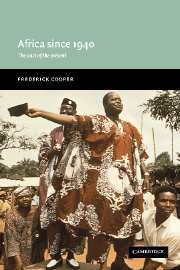Book contents
- Frontmatter
- Contents
- List of plates
- List of figures
- List of maps
- List of tables
- Preface
- Map 1 Africa: countries and cities, c. 2000
- 1 Introduction: from colonies to Third World
- 2 Workers, peasants, and the crisis of colonialism
- 3 Citizenship, self-government, and development: the possibilities of the post-war moment
- 4 Ending empire and imagining the future
- Interlude: rhythms of change in the post-war world
- 5 Development and disappointment: social and economic change in an unequal world, 1945–2000
- 6 The late decolonizations: southern Africa 1975, 1979, 1994
- 7 The recurrent crises of the gatekeeper state
- 8 Africa at the century's turn: South Africa, Rwanda, and beyond
- Index
Interlude: rhythms of change in the post-war world
- Frontmatter
- Contents
- List of plates
- List of figures
- List of maps
- List of tables
- Preface
- Map 1 Africa: countries and cities, c. 2000
- 1 Introduction: from colonies to Third World
- 2 Workers, peasants, and the crisis of colonialism
- 3 Citizenship, self-government, and development: the possibilities of the post-war moment
- 4 Ending empire and imagining the future
- Interlude: rhythms of change in the post-war world
- 5 Development and disappointment: social and economic change in an unequal world, 1945–2000
- 6 The late decolonizations: southern Africa 1975, 1979, 1994
- 7 The recurrent crises of the gatekeeper state
- 8 Africa at the century's turn: South Africa, Rwanda, and beyond
- Index
Summary
Let us pause for a moment to think about ways to grasp the timing of change during the half-century after World War II. A narrative of “triumph and failure,” of “hope and disillusionment” captures something of the time. It calls attention to the struggle for independence, the joy of seeing colonial rule end, and the subsequent despair at the inability of independent African states to sustain peace, democracy, and economic and social progress. The crisis that hit the Congo within weeks of independence in 1960, the coup that overthrew the pioneer of nationalism, Kwame Nkrumah, in 1966, and the Biafran war of 1967–70 mark political turning points.
By the late 1960s Africa's leading intellectuals were calling attention to moral corruption and political passivity in the wake of earlier hopes. Some scholars began to argue that independence was an illusion: the new states of Africa were “neo-colonial,” politically sovereign, but economically dependent and culturally submissive. If the neo-colonial interpretation located power and blame in the west, others argued that the years after 1960 revealed a weakness in Africa itself, habits rooted in either African culture or the still-powerful mental grip of colonialism. The delayed freedom of Portuguese Africa in 1975 or Zimbabwe in 1979 suggested repeat performances: even intense mobilization for protracted armed struggle in these regions offered no better preparation for independence than the largely peaceful decolonizations of the 1960s. And some warn that the freedom of South Africa in 1994 may lead to similar disillusionment.
- Type
- Chapter
- Information
- Africa since 1940The Past of the Present, pp. 85 - 90Publisher: Cambridge University PressPrint publication year: 2002

